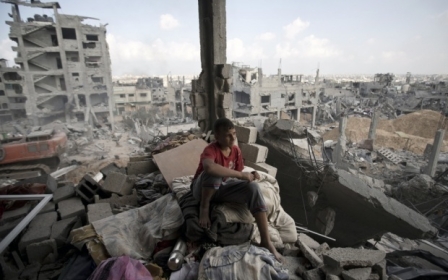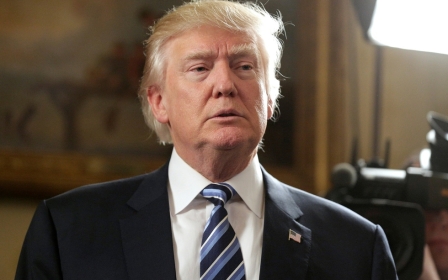Shattered dreams: Trump kills hopes of Middle East’s most vulnerable

ISTANBUL, Turkey – Azadeh sits weeping silent tears on the night of 24 January as her husband calls their sponsor and other friends in the United States, trying to make sense of Donald Trump's reported plans to ban people from several Middle East countries.
“What can I do? There is nothing I can say to make her stop crying. It breaks my heart but I am helpless,” Ninous, 34, an Iranian refugee who was accepted for resettlement to the United States two years ago, told Middle East Eye.
Their lives were already disrupted after facing death in their home country. Now they find themselves in limbo yet again as the new US president suggests he will ban people from Middle Eastern countries, including Iran, from entering the United States.
To us America represents hope and a chance to rebuild our lives. I cannot understand Mr Trump - Ninous
Azadeh, 32, and Ninous – not their real names because they fear retribution from the Iranian state, and now potentially also from US officials – fled to Turkey four years ago after facing persecution for converting to Christianity.
“We are not regular immigrants. We are refugees. We don’t have a choice. To us America represents hope and a chance to rebuild our lives. I cannot understand Mr Trump,” said Ninous.
“For two years since the elation we experienced when we were accepted as refugees by America, we have been planning our future there. All our hopes and dreams are based on that. Now one sentence may shatter our world and lives."
Azadeh and Ninous applied for asylum to the UN’s refugee agency, UNHCR. Two years ago in 2015 they were given refugee status and told the United States had accepted to resettle them - they had passed the US refugee interviews and medical exam.
There are hundreds of asylum applications made each year to UNHCR in Turkey alone, mostly by people from Iran, Afghanistan and Iraq.
The situation is different for Syrians, who were willingly admitted into Turkey in the early years of the war. Turkey currently hosts around 2.7 million Syrian refugees, officially called "guests" - the situation has changed over the past year, though, with many reporting that the border between Turkey and Syria has been closed.
But Turkey does not accept refugees from other non-European states, so UNHCR has to seek third countries willing to resettle those recognised as refugees.
For the last six months, Ninous and Azadeh have been waiting for their tickets to board a flight to the US. Now they fear that might never happen.
Ninous said the hardships they faced at home due to their religious convictions, and that of the past four years, has left them mere shells of the people they once were.
The bureaucratic delays on the part of the US also rankle with Ninous. He said he was even assigned a case officer from the US Citizenship and Immigration Services department, but progress has been slow. Now, he and his wife may have to pay the price for the delays.
I don’t recall a single Iranian being involved in any of these terror attacks in the world in recent times - Ninous
“Most refugees I met here were resettled three to four months after they were accepted. I am stuck for the past two years. Why? Normally I would already be in America and this new worry would not hang over my head,” he said.
Since they are recognised as refugees by the United Nations, Ninous and Azadeh can be offered resettlement in another country willing to accept them, but the very thought fills them with fear.
Ninous said they had first-hand knowledge from their experience in Turkey of how important support groups comprising people who have been through a similar situation are. He said friends he made among the refugees in Turkey who are now resettled in the US will provide them with the support during their early days in America.
He also said the shock caused by Trump’s remarks is so great that he is unsure if they can survive the strain much longer.
He said a combination of the persecution they faced at home and the hardships they had to endure as refugees has left them vulnerable. Non-Syrian asylum seekers and refugees are sent to various smaller conservative Anatolian towns and not allowed to reside in Turkey’s major urban centres. They are not permitted to work either.
“We were relatively well-off at home in Shiraz. I had a successful travel agency business. But there was only so much money we could bring with us to Turkey when we fled. Our first two years here was spent coming to terms with what we had experienced and what would happen to us,” said Ninous.
The last two years, he said, have brought about another set of challenges.
“Azadeh bursts into tears daily at the limbo we are in and our financial condition. That hurts me even more,” said Ninous.
“Sometimes I find illegal work waiting tables or washing dishes for 10-12 hours a day. If I am lucky I get paid something. Otherwise it is just a few slaps and ridicule since they know I can’t file a complaint.”
"Mr Trump is portraying us as the same demons that we are forced to escape from in the first place”
Ninous is still holding onto a slight hope for themselves because Trump initially said the ban would not apply to those who faced religious persecution.
But he still disagrees with such a policy, asking what will happen to those Iranians, Afghans, Iraqis and Syrians forced to flee because they are LGBT, or because of their political beliefs, or for a plethora of different reasons.
“I don’t recall a single Iranian being involved in any of these terror attacks in the world in recent times. All Iranians I know in America integrated very quickly and have made successful careers for themselves,” he said.
“The Afghans, Iraqis and Syrians fleeing are not the bad guys either. Their lives were destroyed by war and, strangely, people from the countries that fund these conflicts get to travel freely.”
“I think it is very wrong and very sad that Mr Trump is portraying us as the same demons that we are forced to escape from in the first place.”
New MEE newsletter: Jerusalem Dispatch
Sign up to get the latest insights and analysis on Israel-Palestine, alongside Turkey Unpacked and other MEE newsletters
Middle East Eye delivers independent and unrivalled coverage and analysis of the Middle East, North Africa and beyond. To learn more about republishing this content and the associated fees, please fill out this form. More about MEE can be found here.






